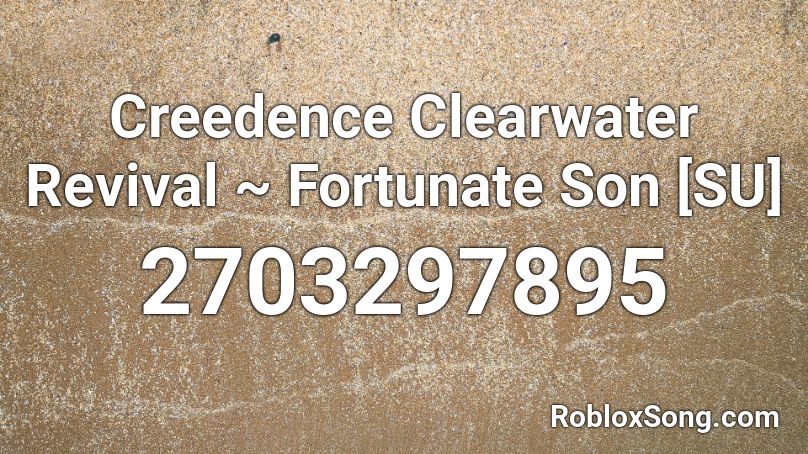
Other artists, like The Rolling Stones and Neil Young, have raised legal objections to the public performance of their recordings. Some folks are born silver spoon in hand, Lord, dont they help themselves. G D7 C7 G It aint me, it aint me, Im no fortunate one. So I found it confusing that the president has chosen to use my song for his political rallies, when in fact it seems like he is probably the Fortunate Son.”įogerty did not say anything about objecting to having his song used at Trump’s rallies. G D7 C7 G It aint me, it aint me, Im no senators son. John’s Church with a Bible,” Fogerty said. “That is exactly what happened recently in Lafayette Park when the president decided to take a walk across the park, he cleared out the area using federal troops so that he could stand in front of St. But when the band plays Hail to the Chief, they point the cannon at you.” In the Instagram post, Fogerty also recited the first lines of Fortunate Son: “Some folks are born, made to wave the flag. Trump did not serve in Vietnam, but got college deferments and a medical deferment for bone spurs in his heels.įortunate Son was released by Creedence Clearwater Revival in 1969, but Fogerty said it could also apply to what is happening today. “I found that very upsetting that such a thing could occur.”ĭevin Nunes To Resign California Congressional Seat, Become CEO Of Donald Trump's Social Media Company The Fortunate Sons are the worlds premier tribute to Americas greatest band: Creedence Clearwater Revival. Written by John Fogerty and performed by Fogerty’s band, Creedence Clearwater Revival, Fortunate Son takes aim at the United States’ political and military elite, the men who push for war but are seldom personally affected by it. Most of the soldiers killed were poor, and a disproportionately high number of them were black. Fortunate Son (1969) is one of the Vietnam era’s best-known protest songs. During the year the song was written, 11,000 Americans had already been killed in the Vietnam War. “Back in those days we still had a draft, and something I was very upset about was the fact that people of privilege, in other words rich people or people of position, could use that to avoid the draft and not be taken into the military,” Fogerty said. Fortunate Son was written in direct response to CCR songwriter Jon Fogerty’s anger about the role of social class and wealth on enlistment. He said that the “inspiration for the song” was the disparity in those who were drafted and those who were getting deferments. In an Instagram post, Fogerty said that he wrote the song in 1969, at the height of the Vietnam war, when he had already been drafted and had served in the military. When the song was played at Trump’s rally in Michigan on Thursday, a number of journalists tweeted that it didn’t appear that the campaign grasped the meaning of the lyrics. The verses are mostly a rushed three-chord background for Fogerty to spit-howl his venom against, though there's a lot of sincere soul as well, particularly when he hits the highest notes.John Fogerty says that Donald Trump’s use of his song Fortunate Son at campaign rallies is “confounding, to say the least,” given that the lyrics to the song were inspired by rich people who were able to avoid the draft during the Vietnam war.



(Interestingly, the title "Fortunate Son" is sung just once, in the very last one more often, he uses the phrase "I ain't no fortunate one.") Although the guitar riffs "Fortunate Son" are constructed around are more basic and less memorable than those on some other Creedence hits, they're effective enough, starting with the slightly devious, curling one that opens the track. That's especially so in the chorus, where Fogerty hammers home the point again and again: it ain't him, he's not a fortunate son. At any rate, Fogerty - who, incidentally, did serve in the army reserve and knew something about having to pay the consequences of militarism - makes his stance on the matter clear, if blunt. It's more of a screed against the privileged in general, using and subscribing to patriotism while sending others to do the dirty work of fighting. Too much, perhaps, has been made by some critics of a pro-working class and anti-privilege ethos in the song, with some seeing it as a blast against those wealthy families who were able to keep their sons out of Vietnam while less affluent people had less options. Lyrically, though, it was one of songwriter John Fogerty's strongest and most uncompromising statements. Musically, though powerful, it was perhaps a shade less memorable than Creedence's other huge hits of the era, like "Down on the Corner," for instance. "Fortunate Son" was, with its flipside "Down on the Corner," a double-sided #3 single in late 1969 for Creedence Clearwater Revival.


 0 kommentar(er)
0 kommentar(er)
